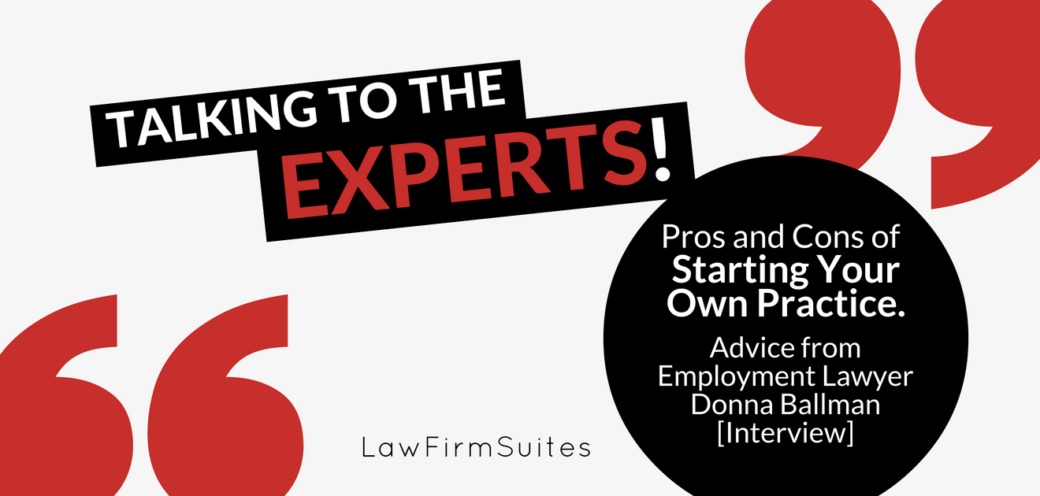Discover how Florida Lawyer Donna Ballman started her own practice,and listen to her input on the pros and cons of running your own firm.
Donna Ballman, president of the Employee Advocacy Law Firm, is a Fort Lauderdale employee-side employment attorney and author of Stand Up For Yourself Without Getting Fired.
We recently caught up with Donna to learn more about some of the issues surrounding employee-side employment law as well as get her insight on the pros and cons of running your own firm. Here’s what she had to say:
Can you tell us about your background and interest in employee-side employment law? How did you become so passionate about helping employees?
I’ve always wanted to help change the world for the better. When I worked for a commercial litigation firm early in my career and a client got hit with a sexual harassment suit, I was the only woman in the litigation department so they decided, “Let’s give it to the chick!”
After that, there was a pregnancy discrimination case. So when I left the firm they sent me their employment cases, and so did everyone I knew. Voila! Eventually, I decided that this was what I wanted to do all the time.
How does working as an employee-side attorney differ from working on the employer side?
I tell my employees we are changing the world one unemployed person at a time. I get to help people when they are going through one of the most traumatic experiences you can have – losing a job. If I can help them through that then I’m happy.
What are some of the more common legal issues you deal with as an employee-side employment attorney? What do your clients come to you for help with?
I do lots of severance agreement negotiations. I defend against noncompete agreement and trade secret lawsuits. And then there are the discrimination, whistleblower, FMLA and other wrongful termination cases. I handle only employee-side issues, and only for non-government employees, so I get a wide variety of issues on the employee side.
What trends or headlines in employment law are you following right now? Why do they interest you?
Noncompete reform is a big issue right now. The White House is investigating it, attorneys general are investigating and some states are passing laws limiting noncompete agreements. It’s important because noncompetes are increasingly being misused against lower level employees to intimidate them. These agreements suppress wages and keep people from leaving abusive workplaces.
The other big issues are the changes to overtime laws, expanding the number of people who are not exempt. Wage theft is a huge concern and so the federal government and states are cracking down on misclassification of employees.
Can you talk to us about your experiences running your own firm? What made you decide to start your own practice?
When I started, it was tough for women to be promoted to partner in a law firm. It became clear to me that I had better opportunities going out on my own. It can be tough, but I find that it’s worth it.
What have been some of the biggest challenges of running your own firm?
When you’re on your own you are the IT department, the chief cook and bottle washer, everything, especially when you just start out. I had no staff for many years. Now I have an office manager who helps keep me on track, and that’s been a lifesaver. When I’m on vacation, I can never unplug. I have to check emails and keep things going.
What about the biggest perks? What do you like about it?
Nobody (other than judges) can tell me what to do. If I want to work from home in the morning on occasion or if I want a day off, I take it. How do you value your freedom? I’m free to do what I want, when I want. I can take the cases I want and turn down those I don’t want.
What advice would you offer other attorneys considering starting their own practices?
Find a niche. It’s hard to start a general practice because nobody will refer you work. If you have a single practice area, others will send you work that they don’t handle, so it’s easier to get started. Also, it’s easier to have a website that stands out if you specialize. Then I suggest to write a blog or articles so you can get the word out about what you handle and your take on cases. If potential clients read an article and like what you say, they will contact you first.
What resources or tools have you found to be the most helpful for running your own practice?
Google Scholar is great for quick, free research. Having a strong website developer who can stay up on optimization is vital. I use Justia. You can start a blog for free using Blogspot. I still use it because it’s so easy. There are lots of ways you can start out that are free and/or inexpensive. Just don’t cheap out on your website.
How has your career evolved since you started practicing?
When I opened my practice I did commercial litigation that included employment law. When I switched to full-time employment law, I did both management and employee-side law. But I decided my bliss is on the employee side, so I only do that now and I’m happier.
I also stopped doing cases against government because that’s sometimes like banging your head against a wall. When it’s not their money, they have no incentive to settle or move things along. My last case against government went for about 10 years with multiple appeals before it finally settled. If you find that an area of practice or type of case is causing 90 percent of your headaches, dump it. Life’s too short to do something you hate.


